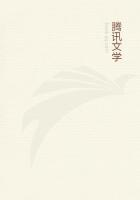This seems to me admirably sublime;yet if we attend coolly to the kind of sensible images which a combination of ideas of this sort must form,the chimeras of madmen cannot appear more wild and absurd than such a picture."Three rays of twisted showers,three of watery clouds,three of fire,and three of the winged south wind;then mixed they in the work terrific lightnings,and sound,and fear,and anger,with pursuing flames."
This strange composition is formed into a gross body;it is hammered by the Cyclops,it is in part polished,and partly continues rough.The truth is,if poetry gives us a noble assemblage of words corresponding to many noble ideas which are connected by circumstances of time or place,or related to each other as cause and effect,or associated in any natural way,they may be moulded together in any form,and perfectly answer their end.The picturesque connexion is not demanded;because no real picture is formed;nor is the effect of the deion at all the less upon this account.What is said of Helen by Priam and the old men of his council,is generally thought to give us the highest possible idea of that fatal beauty.
O'v vemebls,TPwas kai eukvnuldas 'Axalous,Toln d'ampi yuvalKi roXuv xPovov aXyea rabxelv Aivws d'aOavarnbl Oens eis wra eolkev They cried,No wonder such celestial charms For nine long years have set the world in arms;What winning graces!what majestic mien!She moves a goddess,and she looks a queen.Pope.
Here is not one word said of the particular of her beauty;nothing which can in the least help us to any precise idea of her person;but yet we are much more touched by this manner of mentioning her than by those long and laboured deions of Helen,whether handed down by tradition,or formed by fancy,which are to be met with in some authors.I am sure it affects me much more than the minute deion which Spenser has given of Belphebe;though I own that there are parts in that deion,as there are in all the deions of that excellent writer,extremely fine and poetical.
The terrible picture which Lucretius had drawn of religion,in order to display the magnanimity of his philosophical hero in opposing her,is thought to be designed with great boldness and spirit.
Humana ante oculos foede cum vita jaceret,In terris,oppressa gravi sub religione,Quae caput e coeli regionibus ostendebat Horribili super aspectu mortalibus instans;Primus Graius homo mortales tollere contra Est oculos ausus.
What idea do you derive from so excellent a picture?none at all,most certainly:neither has the poet said a single word which might in the least serve to mark a single limb or feature of the phantom,which he intended to represent in all the horrors imagination can conceive.In reality,poetry and rhetoric do not succeed in exact deion so well as painting does;their business is,to affect rather by sympathy than imitation;to display rather the effect of things on the mind of the speaker,or of others,than to present a clear idea of the things themselves.This is their most extensive province,and that in which they succeed the best.
VI
Poetry Not Strictly An Imitative Art Hence we may observe that poetry,taken in its most general sense,cannot with strict propriety be called an art of imitation.It is indeed an imitation so far as it describes the manners and passions of men which their words can express;where animi motus effert interprete lingua.There it is strictly imitation;and all merely dramatic poetry is of this sort.But deive poetry operates chiefly by substitution;by the means of sounds,which by custom have the effect of realities.Nothing is an imitation further than as it resembles some other thing;and words undoubtedly have no sort of resemblance to the ideas,for which they stand.














